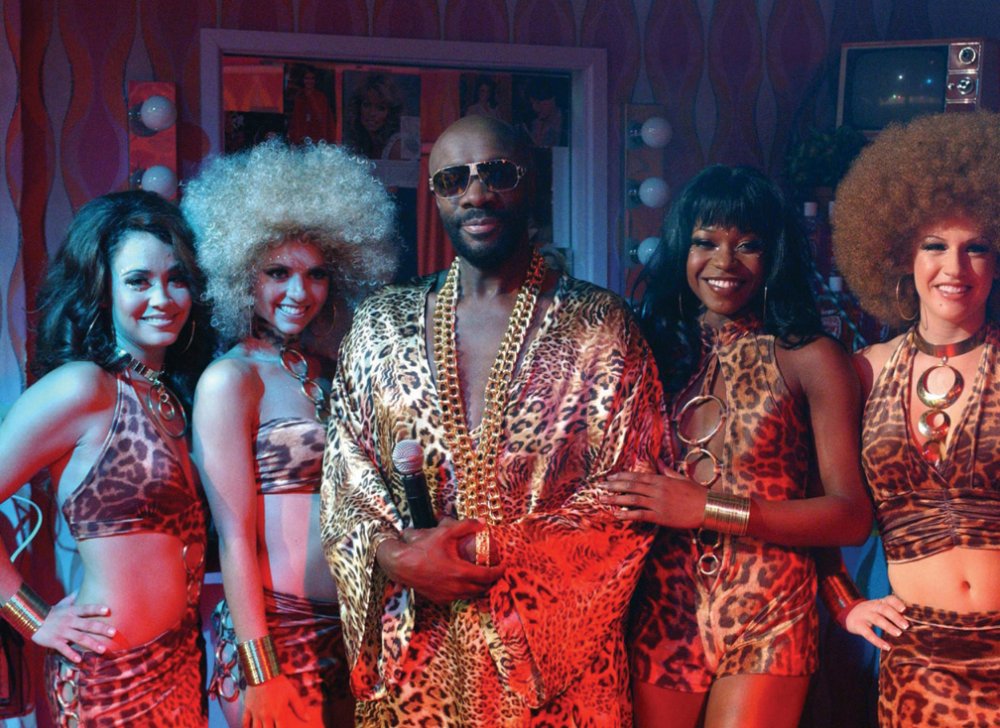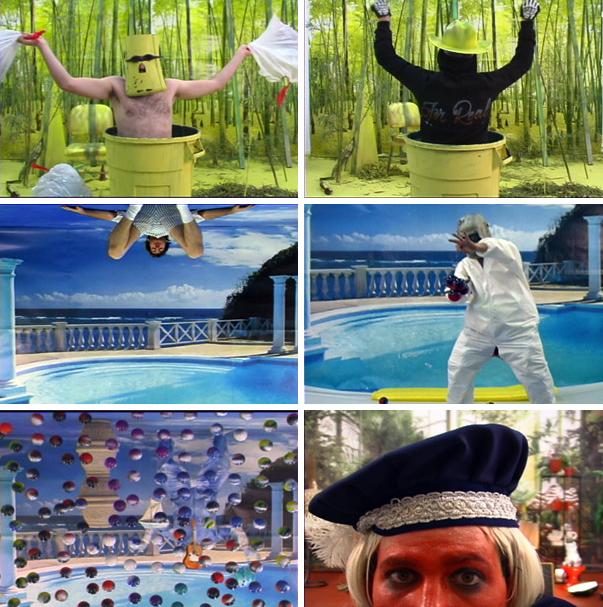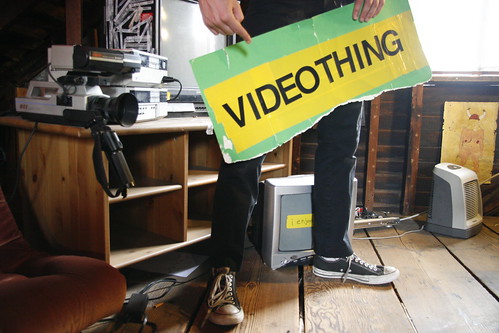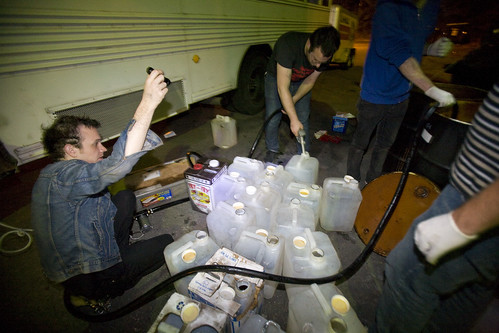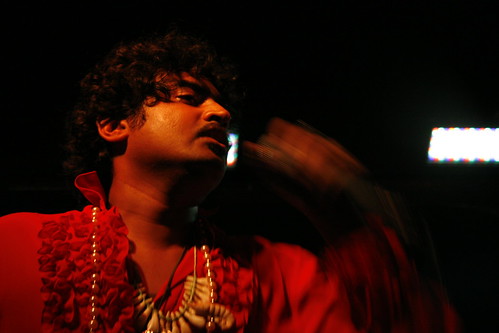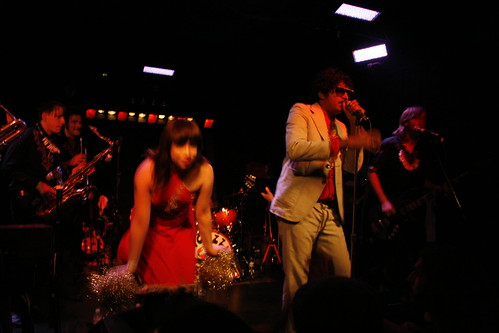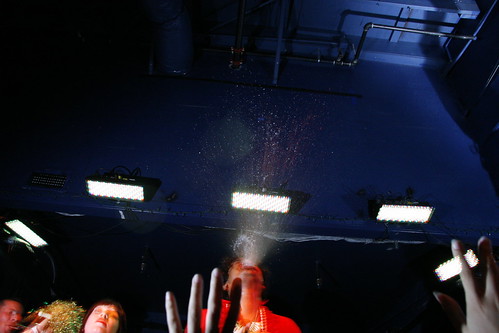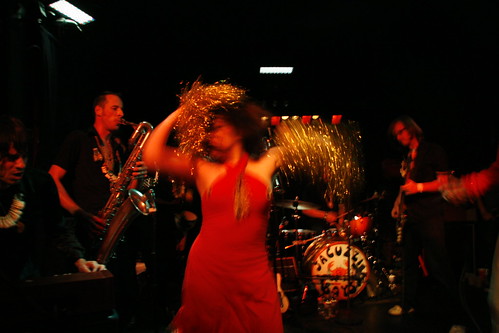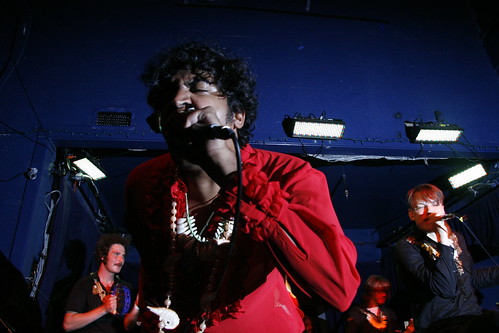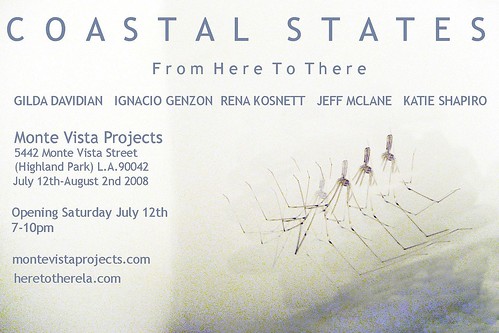Feature, LA Weekly
Extended Interview- Richard Swift "Not a rock n' roll romantic"
Download his new EP, Ground Trouble Jaw, for free Here

Richard Swift. Photograph from the album Richard Swift As Onasis.
RICHARD SWIFT'S ONE-MAN GENRE
The prolific singer, whose music defies categorization, creates music in his own, Swiftian style.By Rena Kosnett, Published on October 16, 2008
Fans of Harry Nilsson know that there is only one genre under which his varied catalog can be properly filed: the “Harry Nilsson” genre. Take, for example, his 1971 album Son of Schmilsson: He jumps from Christmas song to droning love story to McCartney-esque pop number to a theatrical number about a spaceman. Nilsson’s bemusing and eclectic tendencies warrant their own category.
The same can be said of Minnesota-born Richard Swift. Like Nilsson, Swift glides fluidly among divergent styles, groups together bold tunes like a clothing designer mixing polka dots and stripes. The evidence is everywhere, from his instrumental album Music From the Films of R/Swift (released under the moniker Instruments of Science and Technology) to his recent Richard Swift as Onasis double EP and his newest, the five-song Ground Trouble Jaw.
Released as a free download in August, Ground Trouble Jaw opens with “Would You,” an airy, warm tune that suggests the Penguins’ doo-wop classic “Earth Angel” — kind of like the Mothers of Invention on their 1968 album Cruising With Ruben & the Jets. Swift continues this mood on the second track, “Lady Luck,” but the tone shifts with the intro of “The Bully,” a funny, monotone spoken-word song in the style of Nilsson’s ironic love song “Joy” or the Modern Lovers’ “I’m Straight.” The final two tracks, “The Original Thought” and “A Song for Milton Feher” (about the famed dance instructor and relaxation coach), channel White Album joviality and Nilsson quirkiness. Swift spoke with L.A. Weekly recently, via telephone from his Oregon home.
L.A. Weekly: Was there a strategic purpose, or a goal, in releasing Ground Trouble Jaw for free?
Richard Swift: I think it was void of either of those two things. I was trying to get around the business of releasing a record. Dressed Up for the Letdown [released February 2007] was finished about a year and a half before it was even released because I was going through negotiations with Polydor the whole time. I grew so tired of waiting around for all these records to be released, you know? Polydor was this major-label situation, always asking you to change stuff on your records, which I was definitely uncomfortable with. I feel really fortunate I was able to get out of my contract with Polydor and have Secretly Canadian put out my records. It made me feel happy about making music again.
With the digital release, I was just trying to break... not the mold with the industry, but to break my mold, to try to do something exciting and last-minute, and not have this big record buildup, like [in a deep, movie-trailer-guy voice] “You just wait until February ’08, when this record drops, it’s gonna change your world.”
There’s something really disarming about just being able to say, “Oh, hey, I’m putting out a record tomorrow.” It deflates the romance of rock and roll, which I appreciate because I’m not a big rock and roll romantic.
L.A. Weekly: I find myself missing the accompanying artwork with this EP. The visual material with your other records is so interesting.
Richard Swift: I do miss that. I mainly just listen to LPs, so you’ve always got this 12-inch object to look at; but there are the Ground Trouble Jaw films, and I do feel like the films are the moving artwork for the EP. Maybe it’s goofy of me to put out footage of me fucking around with a theremin and drinking beer with my buddies, but it’s also somewhat therapeutic — there’s a fondness there. The cover for the new Swift record, which will be titled The Atlantic Ocean, is going to be the most involved album artwork that [video artist] Lance [Troxel] and I have ever done.
L.A. Weekly: One of the tracks on GTJ is “A Song for Milton Feher.” I’m wondering about your connection to him, because my mother was listening to that relaxation record of his while she was going through menopause. Some of his quotes are really nice and meditative: “Feel yourself pressed into the earth,” “Feel the earth holding you up,” “Make contact with the ground.”
Richard Swift: Strangely enough, Milton’s a friend of mine. He’s 96, 97 years old. He is genuinely one of the most amazing human beings I’ve ever been able to hang out with. How we met is phenomenal. You can never write this kind of shit. After my father heard the first record I ever made in L.A., he’s this Spanish guy, and he said [with a Spanish accent], “Oh, Richard, this sounds like you’re walking without trying too hard.” And I was, like, “Well, that makes sense, because I’m going to name the record Walking Without Effort.” Then, probably a week after I finished Walking Without Effort, I was doing my regular thing, flipping through record bins, and I came across this Milton Feher album, Relaxing Body and Mind (1962). I turned it over to look at the back, and one of the audio chapters was titled “Walking Without Effort,” and I was, like, “What!” So I bought the record, took it home, and about a month after that, I started having a dark period of panic attacks. So I started listening to that record in a different light, hoping it would help me to relax my broken mind.
I wanted to sample Milton’s voice for an Instruments of Science and Technology track, so I had to call him to clear the rights for that, and we started talking quite a bit, and we’ve been chatting on the phone ever since. And just this last year, we finally met up. He lives in New York, and I was there recording with Mark Ronson, so before the session started, I was, like, “Oh, I gotta call Milton and let him know I’m here.” Turned out I was staying two blocks away from his apartment! So we met, and I had about a six to seven-hour session with him. I can’t begin to explain how a connection like that works. It seemed life-altering just to be able to talk to him regularly, but to be able to spend a considerable amount of time together. If you wrote that in a movie, no one would ever imagine that it could be true.
L.A. Weekly: Was it a surprise that Stereolab asked you to tour with them?
Richard Swift: Yeah, it was, I have no idea how I got on their radar. I am a big fan of their music, so I feel really fortunate that they asked me to be on their tour. In the last couple of years, I’ve been able to tour with a lot of bands that I have a lot of respect for, and Stereolab’s definitely up there. It started a year ago touring with Wilco, and recording at their loft, making my little documentary films there, and now a year later touring with Stereolab. It’s surreal.
L.A. Weekly: Did you and Jeff Tweedy have a personal connection before he asked you to tour with Wilco?
Richard Swift: There’s a show in England called "Later With Jools Holland," and I was on the show when Wilco was on the show, and so was LCD Soundsystem, and a couple other English bands whose names I am not going to mention. Before I sang my song, Pat [Sansone] from Wilco came over and was like, “Hey Swift, I have your record and I really like it. I’m really happy that you’re here.” So we did our songs and were waiting around, because after the show the bands have the opportunity to re-record their song if they want. So this specific English band tried re-recording their song like five times, it was awful to begin with. So the Wilco guys and I were sitting around really annoyed, and Jeff and I were able to be old sarcastic American curmudgeons together, just like, “Oh, these young kids,” blah blah blah, and we had a couple beers- well, Jeff didn’t have any, he had diet cokes, but I had a couple beers. And we shot the shit, and I just chocked it up to being a cool experience, but five days later it was set that I would go on a month long tour with them across the states. Jeff was aware of my situation—at that point, I had been on the road for two or three years—so it was encouraging of him to ask me to come record at his studio. To have somebody I respect believe in what I was doing—it was a huge shot in the arm.
L.A. Weekly: Why did you decide to drop the "Ochoa" from your name?
Richard Swift: It has to do with me never being completely comfortable with that last name… It gets more into personal family stuff. But Swift is my middle name and my mother’s maiden name, and it was what my mother wanted my first name to be. I was raised, for a large part of my life, by my grandfather Clifford Swift, and he was quite a phenomenal piano player when he was younger. But his family got sick of him practicing all the time, and kind of crushed his spirit and told him not to play anymore, so part of me feels like I’m carrying on that legacy for him, doing something he would’ve liked to do but never had the chance.
L.A. Weekly: What are the differences between the music you make under the Instruments of Science and Technology name and the Richard Swift name, and the older Dicky Ochoa and Company music?
Richard Swift: Ultimately, the old Dicky Ochoa and Company stuff was me trying to pay my rent. I didn’t feel like I was really involved. I felt like I was a studio musician on my own record. The Instruments, and Swift as Onasis music is what I care about. There are definite stylistic differences—there are different elements and experimentations with each project. To me, it wouldn’t make sense to mix Instruments and Swift music or Onasis and Instruments music. In retrospect, though, I think a lot of people were getting annoyed that I was putting out all these side projects.
L.A. Weekly: Who was getting annoyed?
Richard Swift: Well, people would send me press clippings that would say, ‘I don’t know, Instruments Of Science and Technology, and Richard Swift as Onasis aren’t as good as Richard Swift records.’ Well, you know what, fuckers, all of these are Richard Swift records. I’m so surprised at press sometimes, or even blogs, because we live in a day and age when everyone has an iPod or iPod shuffle, myself included, and to think that an artist would only put out one type of record in their career is very narrow. I think most artists should be held to a standard of really pushing themselves to try all sorts of things.
If you look at artists like John Lennon and Neil Young, they made their weird electronic records and '50s records, and the critics panned them, but they had the backbone to push themselves, and to fight boredom. When you put out records, you’re automatically creating a stereotype—from that first record, you become a cartoon. So I find it very inspiring when I can see these musicians trying to develop new music after such long-term careers.
Bob Dylan’s had a recent resurgence, but in the '80s nobody gave a shit about Bob Dylan. If you talked to people about Bob Dylan, they would say, “Oh, his old records were good but his new records are shit. He’s never gonna put out another good record.” But now, he’s making some fantastic music.
L.A. Weekly: Did having kids change the way you approach music?
Richard Swift: I don’t know. I would never walk up to the mic and say, “I wrote this one for my daughter.” But in “The Songs Of National Freedom” there’s a line that says “I’m alive, I’m alive, I’m alive/So tell my daughters not to cry,” and that’s not just about having kids but it’s also about understanding generational differences, and similarities. I have a lot of respect for guys who play rock n’ roll and then go home and have BBQs with their neighbors and spend time with their kids. Having a family is amazing, and really good for me because I do tend to be self-destructive and they keep me in check. Tom Waits is a family man, and he’s making phenomenal records.
L.A. Weekly: And he’s written a lot of music with his wife.
Richard Swift: That’s so cool. I wish my wife was even remotely musically inclined. She paints, though. There are a lot of guys making music now, living the rock n’ roll lifestyle and they act like pricks to everyone they know, and I just don’t want to be involved in that. It’s not appealing to me at all. I don’t give a fuck about Sid and Nancy or any of that. What’s appealing to me is living in a small town, and being with some really fine people, and being with my special lady friend.
